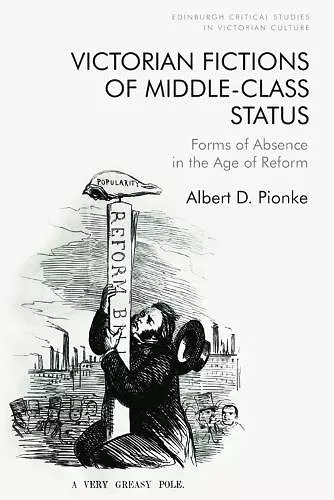Victorian Fictions of Middle-Class Status
Forms of Absence in the Age of Reform
Format:Hardback
Publisher:Edinburgh University Press
Published:29th Nov '22
Should be back in stock very soon

Reconstructs the surprising, self-interested, at times paradoxical attempts of Victorian novelists to define the limits of middle-class status Adopts an interdisciplinary approach that combines sociological theory, social and political history, and literary history and critique Makes a timely contribution to a long tradition of socio-literary study that both stretches back to the nineteenth century itself (i.e., Hippolyte Taine's History of English Literature [1863]) and engages with contemporary literary and social theory (i.e., Maria Bachman and Albert Pionke's The Socio-Literary Imaginary in 19th and 20th Century Britain [2020]) Proposes a new and newly historicized theory of middle-class status grounded in absence that acknowledges the anxiety expressed by members of the Victorian middle classes about their own legitimacy and avoids the over-determined conclusions that sometimes accompany sociological readings of cultural works Reconnecting this more nuanced definition of status to the need for recognition from those in a position to be dominated, shows how Victorian novelists built into their texts a defence of their own individual popularity and of the growing popularity of fiction over poetry Combines readings, both pithy and expansive, of Victorian novels by both major canonical novelists Charlotte Bront , Charles Dickens, George Eliot and less well-remembered authors, such as William North, Charles Reade, and Charlotte Yonge Victorian Fictions of Middle-Class Status recovers the novelistic pervasiveness of a Reform-Era rhetorical form, the negative assertion of value, which grounds middle-class claims to social authority in repudiations of such conventional warrants as birth, wealth, numerical preponderance, command of fact and, specifically for women, the symbolic phallus. Bringing together historical, literary and sociological theory, this study recaptures the Victorians' broad sense of epistemological uncertainty about their rapidly changing society, reconstructs novelists' specific attempts to legitimate their traditionally low-status genre and offers fresh readings of novels by Charlotte Bront , Wilkie Collins, Charles Dickens, George Eliot, Elizabeth Gaskell, William North, Anthony Trollope, William Makepeace Thackeray and Charlotte Yonge, among others.
"Pionke's striking innovation is to propose that mid-Victorian bourgeoisie strove to justify their status in negative terms. His persuasive and thought-provoking work allows readers to connect current-day notions of class and economic privilege to an earlier period of capitalist plutocracy a period in which questions of privilege and invidious economic comparisons found their expression in very different cultural forms."" -John Plotz, Brandeis University
ISBN: 9781399507707
Dimensions: unknown
Weight: unknown
248 pages